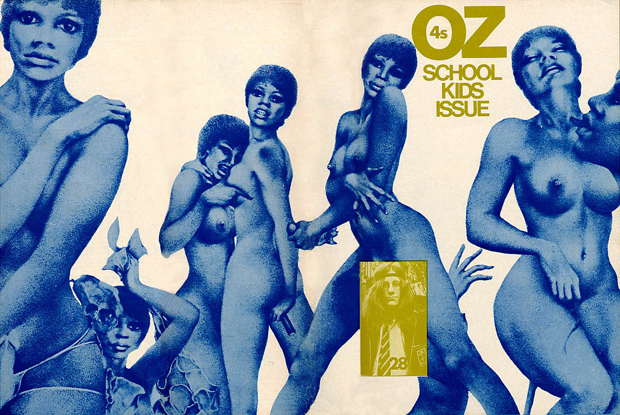
The school kids issue of Oz magazine lead to one of the longest conspiracy trials in England (Image: OZ/Wikimedia Commons)
Richard Neville, who co-founded the 1960s counterculture magazine Oz, has died in Australia aged 74.
The satirical magazine, which was first published on April Fool’s Day in 1963, poked fun at socially-conservative Austrailia and tackled taboo subjects such as abortion, homosexuality, sexism and racism.
The editors of the London edition – Neville, along with Jim Anderson and Felix Dennis – were prosecuted under the Obscene Publications Act in 1971 for a schoolkids issue (edited by teenage schoolchildren). Particular offence was caused by a cartoon of Rupert Bear having sex – in a collage created by schoolboy contributor Vivien Berger. The editors were found guilty and the convictions provoked an outcry. Hundreds demonstrated outside the Old Bailey in London, including John Lennon and Yoko Ono. The verdict was later quashed on appeal.
The last Oz was published in 1973.
In 2008, the English barrister John Mortimer spoke to Index about defending the editors of Oz magazine and taking on one of the most infamous obscenity cases on the 1970s.
Index: What were the grounds for prosecution?
John Mortimer: Well, it was sort of the birth of that particular Obscene Publications Act [1959], which was Roy Jenkins’s doing [Jenkins was principal sponsor of the bill as a backbench MP]. It was meant to be liberalising, because it allowed defences of literary merit and scientific merit and all sorts of ‘bits’ of merit. It was a test of that and the Obscene Publications Act, which was meant to be a work of great liberality. It would test obscenity, which was something that would tend to deprave and corrupt the people who were likely to read it. But then there were numerous defences – that it was of literary merit or historical merit or scientific merit and so on. It seemed rather strange you could be depraved and corrupted, and on the other hand you knew more about history – that could be a defence. So it never ever seemed to me to be a particularly sensible piece of legislation.
Index: What did you think of it first of all, when you discovered what the charges were?
John Mortimer: It was the schoolkids Oz and nobody wanted to do it. Everybody turned it down. They thought it was disgraceful, defending the schoolkids Oz like that. Numerous QCs turned it down.













